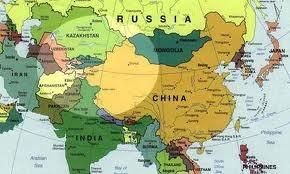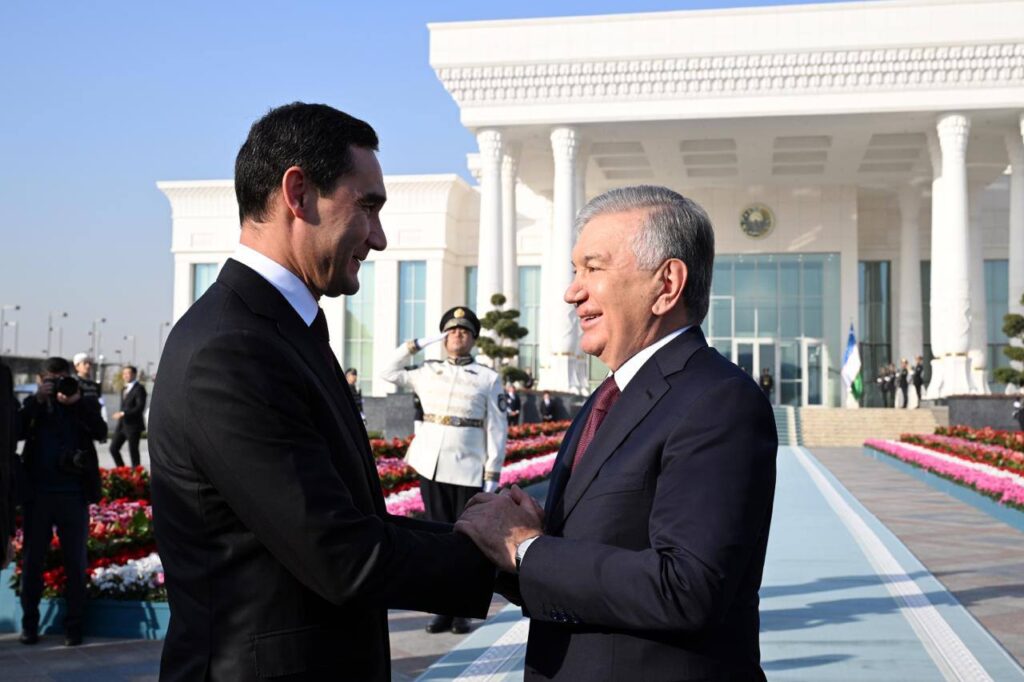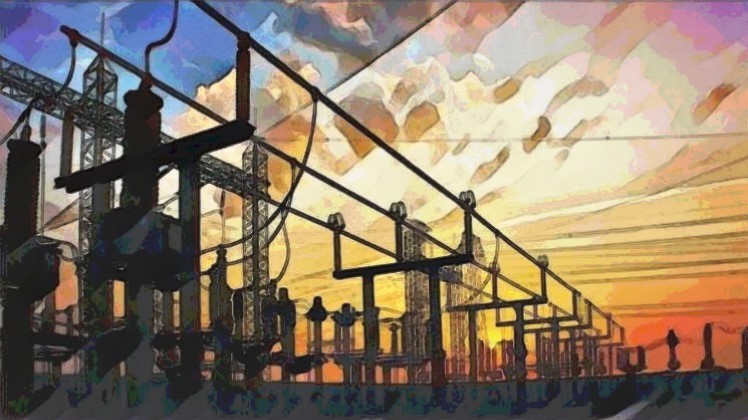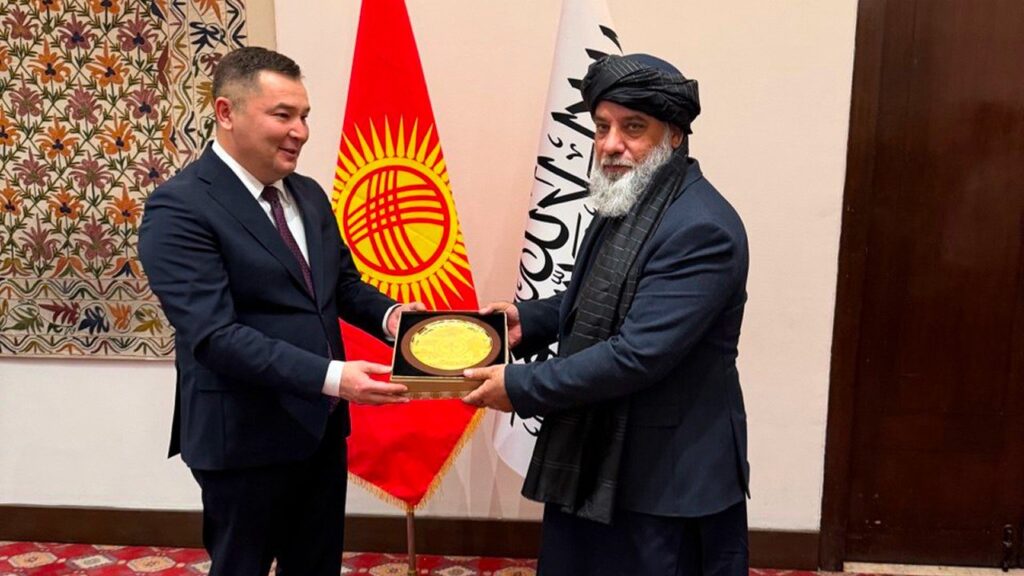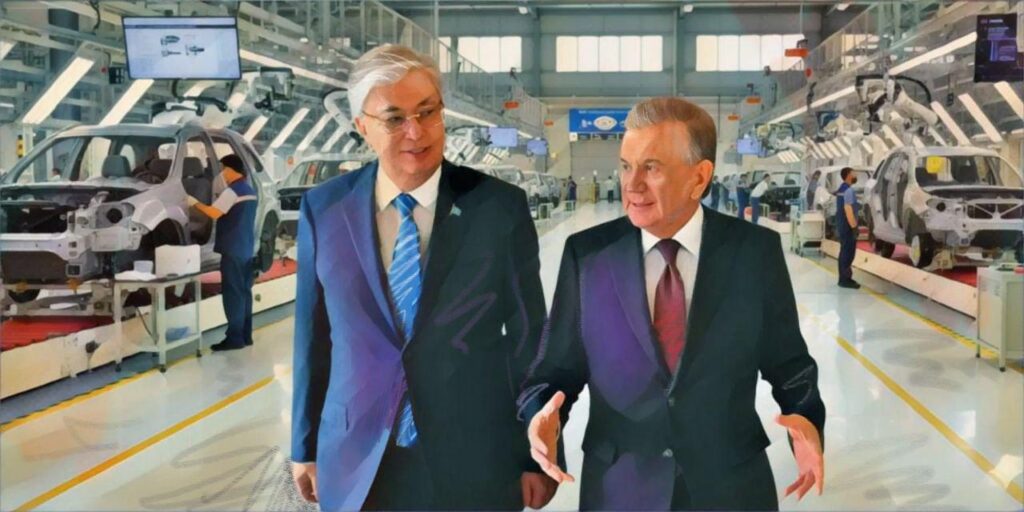BISHKEK (TCA) — The Publisher’s note: Throughout the 19th and 20th centuries, Central Asia was the scene of intense geopolitical struggle and the Great Game between the British and Russian Empires, and later between the Soviet Union and the West, over Afghanistan and neighboring territories. Into the 21st century, Central Asia has become the area of a renewed geopolitical interest, dubbed the New Great Game, largely based on the region’s hydrocarbon and mineral wealth. On top of that, the region now is perhaps the most important node in the implementation of China’s One Belt, One Road initiative through which Beijing aims to get direct access to Western markets. Every week thousands of news appears in the world’s printed and online media and many of them may escape the attention of busy readers. At The Times of Central Asia, we strongly believe that more information can better contribute to peaceful development and better knowledge of this unique region. So we are presenting this Weekly Digest which compiles what other media have reported on Central Asia over the past week.
KAZAKHSTAN
Kazakhstan’s Struggle to Modernize
Kazakhstan needs new cadres to run the economy and society which are in acute need of modernization
Nov 26 — “Kazakhstan, large in territory, but scarcely populated Central Asian republic, rarely gets attention in world news. The country is most known for vast oil fields and as the largest uranium exporter in the world. Nursultan Nazarbayev, Kazakhstan’s President who also holds the official title of the “Leader of the Nation,” uses the country’s natural resources for personal enrichment, but also for advancing some daring reforms. A former communist boss and autocrat, Nazarbayev has ruled Kazakhstan since 1989.” READ MORE: https://www.insidehighered.com/blogs/world-view/kazakhstan’s-struggle-modernize
Incredible Bird-Shaped Fountain Invites Visitors to Kazakhstan’s Presidential Park
Astana’s Presidential Park uses its unique landscape architecture to show the independence of the new Kazakh capital city
Nov 27 — “In the heart of Kazakhstan’s capital lays Presidential Park, a massive public area that stretches out in front of the Ak Orda Presidential Palace. This unique landscape and architecture is part of Astana’s rebirth as the capital of the former Soviet country. Spilling over nearly 60 acres, the green oasis sits within the city, filled with eye-catching symbolism.” READ MORE: https://mymodernmet.com/astana-presidential-park/
Kazatomprom IPO With Astana International Financial Center (AIX) Shows Global Appetite For Uranium
As Russia and China find themselves subject to U.S. sanctions, and Central Asia continues to grow, the Astana International Financial Center may become an important stock market between Frankfurt and Shanghai
Nov 27 — “Some say nuclear energy is the stepdaughter of the energy industry. Many investors beg to differ. On November 14, Kazatomprom (KAP), the state-owned uranium production company of Kazakhstan made history by becoming the first initial public offering of a large Kazakh company in more than a decade. This is a dramatic finale for two important entities: the newly launched Astana International Financial Center’s (AIFC) stock market, and Kazatomprom, which is compared to the Saudi Aramco of uranium production.” READ MORE: https://www.forbes.com/sites/arielcohen/2018/11/27/kazatomprom-ipo-with-astana-international-financial-center-aix-shows-global-appetite-for-uranium/#74027cdf519d
Hackers eyeing Kazakhstan as a safe haven
Kazakhstan has faced the growing threat of international cybercrime groups penetrating the country, but Kazakh authorities lack qualified personnel to address the problem
Nov 29 — “Imagine a small town in the middle of Kazakhstan’s steppes. An elderly lady is speaking to her grandson over Skype. He moved to the big city for university. “Come home for the holidays. I’ll make you beshbarmak,” the grandmother says. “Ok then, I will,” the young man says. As the woman shares some gossip and asks if her grandson is making sure to wrap up warm, her laptop is unbeknownst to her performing a series of illicit operations. Money is being spirited out of a bank account halfway across the planet.” READ MORE: https://timesca.com/index.php/news/20550-hackers-eyeing-kazakhstan-as-a-safe-haven
KYRGYZSTAN
Kyrgyzstan Drawn Into China’s Muslim Crackdown
Kyrgyzstan is tied to China by a multitude of trade and ethnic links, and is also dependent on Chinese infrastructure investments
Nov 29 — “Kazakhs caught up in China’s detention camps in the Xinjiang region have been a vital source of information on the secretive system, and forced the government in Astana to take note. Now it appears that Kyrgyzstan may also be forced to address its relationship with Beijing in light of its intensive campaign against Muslims.” READ MORE: https://www.tol.org/client/article/28088-kazakhstan-china-muslims-uighurs-minority-xinjiang.html
Kyrgyz MP Wants Only Good News
Kyrgyzstan is trying every ways possible to increase the number of tourists coming to the country, but sometimes such efforts look odd enough
Nov 30 — “A member of Kyrgyzstan’s parliament proposedbanning the publication of bad news in Russian and on the internet in order to attract foreign tourists to the country.” READ MORE: https://thediplomat.com/2018/11/kyrgyz-mp-wants-only-good-news/
Kyrgyzstan: Governments change but the environmental problems remain
Bishkek’s environmental problems, including the smog over the city in winter, require complex solutions
Nov 30 — “Kyrgyzstan’s capital Bishkek is gradually turning from one of the greenest cities of the former Soviet Union into a gassed and smoggy one. The public outrage intensifies in cold seasons, when a shroud of smog covers Bishkek, and subsides in spring. The Government and state agencies regularly make decisions to improve the environmental situation in the capital but it is getting worse every year.” READ MORE: https://timesca.com/index.php/news/26-opinion-head/20555-kyrgyzstan-governments-change-but-the-environmental-problems-remain
Xinjiang Authorities Arrest Leading Kyrgyz Historian For ‘Undecided’ Crime
Several prominent intellectuals have gone missing in Xinjiang in recent months and are believed detained in “political” re-education camps, where authorities have detained Uyghurs and other Muslim ethnic minorities accused of harboring “strong religious views” and “politically incorrect” ideas
Nov 30 — “Authorities in northwest China’s Xinjiang Uyghur Autonomous Region (XUAR) have arrested a leading Kyrgyz historian for an as of yet “undecided” crime after he published dozens of articles and several books examining the golden era of his ethnic group’s history, according to official sources. Askar Yunus, a 49-year-old researcher at the History Research Department of the Academy of Social Sciences of Xinjiang, was taken into custody late last month from his home in the regional capital Urumqi, a staff member from the institution told RFA’s Uyghur Service, speaking on condition of anonymity.” READ MORE: https://www.rfa.org/english/news/uyghur/historian-11302018164026.html
TAJIKISTAN
What Really Happened at Khujand Prison in Tajikistan?
Claims by the Islamic State to be behind the Tajik prison riot may have serious implications for the poor Muslim country and its authorities
Nov 27 — “Last week, the government of Tajikistan broke its general silence about a recent outbreak of violence at a prison in the country’s north. What has been described as a “riot” apparently broke out near midnight on November 7 at a high-security prison in Khujand. Initial reports varied, as typically happens with breaking news events, with the casualty number ranging from 13 inmates to more than 25, before skyrocketing in the days that followed.” READ MORE: https://thediplomat.com/2018/11/what-really-happened-at-khujand-prison-in-tajikistan/
Tajikistan toughens punishment for brothel keeping
Prostitution has traditionally been a taboo topic in Tajikistan, but in legal terms it is only a misdemeanor offense punishable by a fine, and there is a rise in the number of sex workers in the country
Nov 28 — “Deputies of Tajikistan’s lower house (Majlisi Namoyandagon) of parliament (Majlisi Oli) have unanimously voted for amendments proposed by the government to the country’s Penal Code. The amendments toughen punishment for brothel keeping, news.tj reports.” READ MORE: https://en.trend.az/casia/tajikistan/2986399.html
Perspectives | Light and nostalgia in Tajikistan
Many Tajiks associate the recently launched giant Roghun mega-dam with a revival of Soviet-style development
Nov 29 — “Building the world’s tallest dam seems almost anachronistic in an age when the environmental and social costs of big dams are widely acknowledged. Yet Tajikistan this month launched the first turbine in its massive Roghun Dam.” READ MORE: https://eurasianet.org/perspectives-light-and-nostalgia-in-tajikistan
TURKMENISTAN
Policymakers overlook Turkmenistan at their peril
Considering that Turkmenistan sits in the heart of the Eurasian landmass and has the world’s 6th largest proven natural gas reserves, what is happening there should be of interest to the world’s policymakers
Nov 23 — “Turkmenistan is a strategic nation in the region, with deep influence over Russian expansionism in the region, stability in Pakistan and Afghanistan, and energy security worldwide. Is this sustainable and what’s at risk? The president of Turkmenistan, Gurbanguly Berdymukhammedov, recently made headlines when a video surfaced of him lifting a weightlifting barbell (without weights) during a cabinet meeting to the applause of his ministers.” READ MORE: https://www.trtworld.com/opinion/policymakers-overlook-turkmenistan-at-their-peril-21899
Turkmenistan: Brussels sprouts and pipeline routes
In its ‘Akhal-Teke: A Turkmenistan Bulletin’, Eurasianet reviews the main news and events in the Central Asian country for the previous week
Nov 27 — “The 12-starred blue flag of the European Union will soon flutter more confidently over the soil of Turkmenistan. Explaining EU plans to upgrade its liaison office in Ashgabat to a permanent mission next year, European Commission High Representative for Foreign Affairs Federica Mogherini averred that Turkmenistan is looking for a “reliable partner for reforms [and] modernization.” READ MORE: https://eurasianet.org/turkmenistan-brussels-sprouts-and-pipeline-routes
Turkmenistan invites foreign investors to develop oil sector in Caspian Sea
Turkmenistan plans to further explore and develop the promising oil fields on the Caspian Sea shelf, which requires foreign investment
Nov 28 — “The Caspian Basin is a region rich in energy and strategically important in terms of regional energy security, since Asian and European main transportation corridors pass through its territtory. Moreover, the Turkmen sector of the Caspian Sea is extremely rich in promising areas for hydrocarbon explorations. Over 200 oil and gas fields have been discovered in Turkmenistan so far.” READ MORE: https://www.azernews.az/region/141705.html
UZBEKISTAN
Uzbek Leaders Insist Reforms Are Designed to Endure
VOA’s Navbahor Imamova examines Uzbekistan President Mirziyoyev’s commitments and their implementation
Nov 25 — “Uzbek officials say a program of broad government reforms initiated by President Shavkat Mirziyoyev is meant to be permanent, a point regularly stressed by the president himself as he seeks to build the state’s credibility with citizens who lived under the autocratic rule of his predecessor, Islam Karimov, for 27 years. But how far have these reforms gone, and what is the ultimate political goal?” READ MORE: https://www.voanews.com/a/uzbek-leaders-insist-reforms-are-designed-to-endure/4669094.html
Long-Closed Uzbekistan Opens Up to the World
VOA’s Navbahor Imamova examines what Uzbekistan under President Shavkat Mirziyoyev wants from the world and how the international community has responded
Nov 25 — “For the first time in a generation, Tashkent has an outward-looking foreign policy. During its first 25 years of independence, Uzbekistan was a prickly neighbor, mired in disputes with its Central Asian neighbors and swinging from support to opposition and back again in its relations with the major powers. But the launch of economic reforms by a new leadership in 2017 shuffled the deck.” READ MORE: https://www.voanews.com/a/long-closed-uzbekistan-opens-up-to-the-world/4669101.html
Uzbekistan granted duty-free entry to EU market
The EU is ready to grant Uzbekistan unilateral tariff benefits within the framework of the “General System of Preferences Plus”, which will facilitate the duty-free entry of more than 6,200 types of Uzbek goods into the European market
Nov 26 — “EU is ready to provide Uzbekistan with the opportunity to supply more than 6,200 types of goods to the European market without duties, Uzbek media reports. This became known after the visit of the governmental delegation of Uzbekistan headed by Foreign Minister Abdulaziz Kamilov to Brussels.” READ MORE: https://www.azernews.az/region/141581.html
Uzbekistan’s bourse is open for business
The stock market is rapidly developing in Uzbekistan as the country has pursued much-needed economic reforms and opened up to the outside world
Nov 26 — “These are busy times for the Tashkent Stock Exchange. Foreign delegations visit almost daily, not only from Korea, which bought a stake, but also from Kazakhstan, Russia, Japan and China. Europeans have been slower to react to the opening up of the country and few European faces are seen on the streets of Tashkent at the moment, but we are welcomed warmly. TSE was founded in 1994, a few years after gaining independence, but lay moribund ever since.” READ MORE: http://www.intellinews.com/uzbekistan-s-bourse-is-open-for-business-152600/
AFGHANISTAN
The risk to the U.S. in abandoning Afghanistan
America is still in Afghanistan because the terror groups operating there would have the unfettered ability to again thrive if the U.S. were to withdraw the last of its troops
Nov 28 — “The latest U.S. casualties in America’s interminable war in Afghanistan are three Special Forces soldiers who had been tasked with helping Afghan troops wrest from the Taliban the southeastern city of Ghazni. On Tuesday their convoy set off a roadside bomb. Three days earlier, another American soldier, a 25-year-old Army Ranger from Washington state, was killed in a firefight with al-Qaida militants.” READ MORE: https://www.chicagotribune.com/news/opinion/editorials/ct-edit-afghanistan-war-taliban-endgame-20181128-story.html
Why are we still in Afghanistan?
The worse scenario for the US is staying in Afghanistan indefinitely, sacrificing American lives to preserve a stalemate
Nov 28 — “The old peacenik slogan was, “What if they gave a war and nobody came?” Today, the question is, “What if they gave a war and nobody noticed?” The American mission in Afghanistan has borrowed a page from Harry Potter, draping itself in a cloak of invisibility. Our war has lasted 17 years and cost upward of $1 trillion, including $45 billion this year. It has killed more than 2,300 Americans and wounded more than 20,000.” READ MORE: https://www.chicagotribune.com/news/opinion/chapman/ct-perspec-chapman-afghanistan-soldiers-killed-trump-1129-20181128-story.html
What are U.S. Soldiers Dying for in Afghanistan?
The question every American—and especially US leaders in Washington—must answer is this: what benefit has been accrued to the country as a result of the sorrows and pain borne by those whose loved ones died in Afghanistan?
Nov 29 — “How much more blood must be spilled in Afghanistan before Washington acknowledges reality and ends the war? Three more American troops were killed in Afghanistan by a roadside bomb on Tuesday and three others wounded; their names are being withheld pending notification of next of kin. These deaths, along with Sgt. Leandro Jasso who was killed in a firefight last Saturday, bring the number of troops killed in Afghanistan this year to thirteen. Unless major changes are made in U.S. strategic policy, they will not be the last to die.” READ MORE: https://nationalinterest.org/feature/what-are-us-soldiers-dying-afghanistan-37487
The US-led coalition is bombing Afghanistan at record levels but it doesn’t seem to be changing the war’s deadly ‘stalemate’
The number of bombs falling on Afghanistan may be spiking, but victory over the Taliban remains elusive, as casualties for the US and especially Afghan forces mount
Nov 30 — “The US and its coalition partners have dropped more bombs on Afghanistan in the first ten months of 2018 than any year in the past five years, the US military revealed Thursday. Between January and October of this year, the US-led coalition dropped 5,982 bombs in support of Operation Freedom Sentinel and Operation Resolute Support, significantly more than the previous years.” READ MORE: https://www.businessinsider.com/the-us-led-coalition-is-bombing-afghanistan-at-record-levels-2018-11
WORLD
Central Asia countries pin hopes on tourism
The tourism industry can become a locomotive of economic development in Central Asian countries
Nov 25 — “Central Asia countries possess abundant resources and great potential for tourism development. The unique heritage, nature and traditions of different peoples and cultures along the Great Silk Road attract tourists from all over the world.” READ MORE: https://timesca.com/index.php/news/26-opinion-head/20533-central-asia-countries-pin-hopes-on-tourism
China’s Trojan Ports
Beijing’s systematic acquisition of European ports is an important component of an ambitious and insidious strategy as part of the Belt and Road Initiative
Nov 30 — “As China continues to project its presence, money, and influence into Western Europe, long-forgotten histories are resurfacing by way of analogy to the present challenge. According to one such narrative, Chinese strategy resembles that of the ancient Sea Peoples—a mysterious confederation that attacked territories in the East Mediterranean largely controlled by the Egyptian empire between 1200 and 900 B.C.E. The metaphor is an imperfect one. Not traditionally of the sea, China has long been a continental power, only now attempting to make the difficult transition to a maritime superpower.” READ MORE: https://www.the-american-interest.com/2018/11/29/chinas-trojan-ports/
